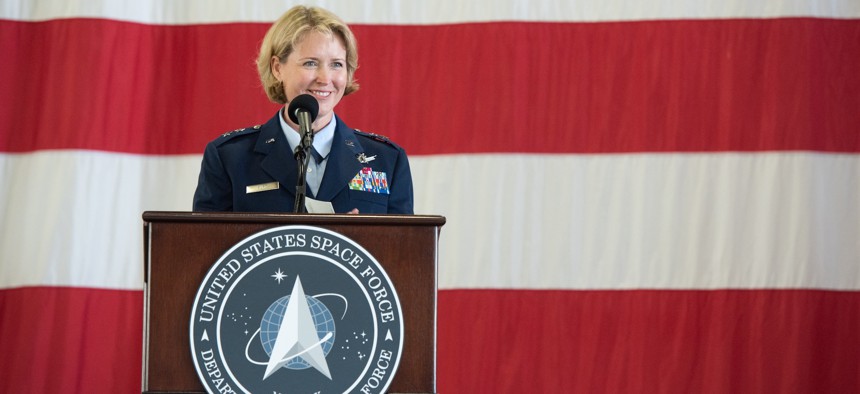Space Force is crafting in-house cyber teams but sees need for closer work with USCYBERCOM

Lt. Gen. DeAnna Burt, shown here in 2020 as a major general at an event in Colorado. U.S. Space Force photo by 2nd Lt. Idalí Beltré Acevedo
U.S. Cyber Command has been “an incredible partner” to the Space Force but does not currently have any personnel from the military branch within its ranks, a top official said.
Addressing cyber threats to critical U.S. space capabilities, including satellites and missile warning systems, will require even closer collaboration with U.S. Cyber Command — or USCYBERCOM — moving forward, a top Space Force official said during an event hosted by the Mitchell Institute for Aerospace Studies on Friday.
Lt. Gen. DeAnna Burt — Space Force’s deputy chief of space operations for operations, cyber and nuclear — called cyber “critical to us,” adding that “on the order of gas to the Air Force, cyber is to the Space Force.”
Burt noted that the force has “developed tools that we’ve put onto our weapons systems to be able to detect cyber intrusions” and is working to “build this cybersecurity mindset into the acquisition process” to bake in stronger digital protections.
She said USCYBERCOM has been “an incredible partner” when it comes to the force’s cybersecurity-related efforts, adding that “we’re clued in through our Delta 6, who is our cyber lead for working on all these things across the enterprise.”
USCYBERCOM’s cyber protection teams also “come visit our capabilities and do assessments of our vulnerabilities,” Burt said, noting that these collaborations are particularly fruitful in the squadrons where the Space Force has already established “mission defense teams” to address cyber threats to operating systems. She said these teams consist of “cyber professionals sitting side-by-side with operators and intelligence professionals getting after a particular mission set.”
But even with Space Force’s in-house cyber initiatives and efforts to stand up mission defense teams with input from USCYBERCOM operators, the service has gaps that need to be addressed moving forward. Burt noted that “we don't have — currently — any Guardians at Cyber Command.”
Space Force has “had conversations” about establishing a service component to USCYBERCOM, Burt said, and she predicted that “down the road, you'll see a growing relationship and force service component with U.S. Cyber Command.”
She added that Space Force is also focused, at least in the near-term, on filling out “the mission defense teams across all of our own capabilities” before pivoting to more of the cyber-related aspects of kinetic warfare.
“I think we do see that down the road — in the next 10 to 15 years — we would actually be trying to put together a cyber mission force,” she said, adding that “our goal would be to support U.S. Space Command, because who better to defend or to attack enemy capabilities in space than those who critically understand it and work on it every day?”






